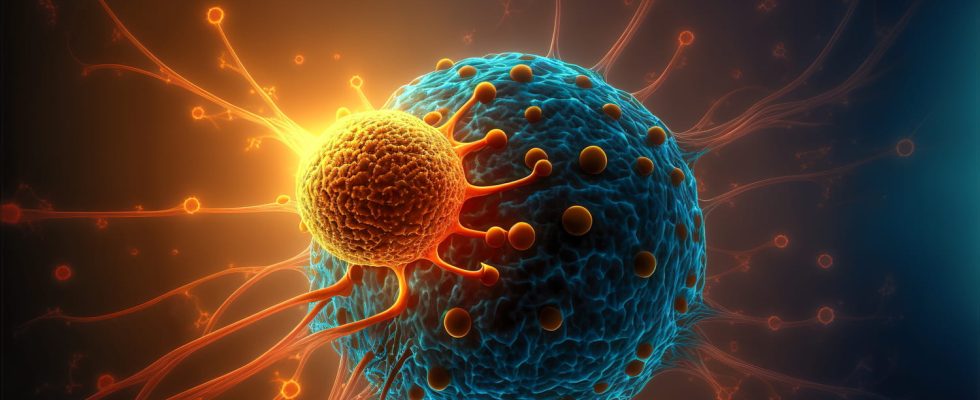We say that a cancer is generalized when, from the initial tumor, it has spread to other parts of the body, to create new tumors called metastases. The cancer is then said to be stage 4: the vital prognosis is engaged. What life expectancy? Can we heal?
By definition, a generalized cancer is a cancer that has developed metastases. In other words, it is a cancer that has spread to other parts of the body (liver, stomach, lungs, bones…). It is also said that cancer is stage 4 or of metastatic stage. The vital prognosis is strongly committed in the event of generalized cancer. What symptoms? What life expectancy? Can we cure it?
What is generalized cancer?
A generalized cancer is synonymous metastatic cancer. It is an initial cancer, called primary, which has developed metastases which have migrated to different parts of the body. “Cancer cells that make up the original tumor have the ability to break off and slip into a blood vessel“, explains Professor Éric Raymond, Head of the Medical Oncology Department at the Center Hospitalier de Paris Saint-Joseph. “Thus, they can reach another organ, since the blood is distributed everywhere. Often it is the liver, bones, lungs and brain“, he details. This spread can be due to the type of cancer, its duration, its grade or its location. The vital prognosis is strongly committed in the event of generalized cancer.
What are the symptoms in case of generalized cancer?
There are common symptoms of generalized cancer:
- Fatigue
- Weightloss
- Lack of appetite
“These are called general signs. Unfortunately, they are common to many other diseasesexplains the oncologist. Then there are the symptoms depending on the area or organ affected: for example, pain if there are bone lesionsor on the contrary in case of liver metastases, this can go unnoticed“The medical necessity is therefore to try to detect these cancerous lesions as early as possible, with scanners,”even when they are small and do not induce symptoms“, says the doctor.
What is the stage of generalized cancer?
Metastatic cancer is called stage 4 cancer. This does not mean that it is the “end stage”, but that the cancer has affected other organs. There are no stages of generalized cancer: “From the moment the cancer is metastatic, it is considered a global disease, whether there is one or more metastases“, explains the specialist.
What are the chances of survival in the event of generalized cancer?
The prognosis will mainly depend on where the metastases go. “If it affects one of the three major organs, the brain, the lungs, or the liver, and the damage is significant, the vital prognosis can be put into play.“, indicates the specialist. But it depends mainly on the number and size of the lesions : if there are several metastases, or a big one which can be complicated, the vital prognosis can be engaged. “Nevertheless, it is important to remember that, even when you have metastases, all is not lost, would like to specify the oncologist. Many advances have been made to make healing more accessible.“And even when one is seriously affected, there is not necessarily imminent death. Life expectancy can be long.” Indeed, the most significant example is that of former President François Mitterrand, who suffered from metastatic prostate cancer during his two seven years. “We must not give up: today, we can heal after several years, if we manage to do all the treatments“, says Professor Raymond.
What treatments when the cancer is generalized?
General treatments: chemotherapy, targeted therapies and immunotherapy
“20 years ago, we had practically only thehas chemotherapy and hormone therapy“, explains our interlocutor. There are several types of chemotherapy depending on the cancer. This treatment consists of kill cancer cells, but this technique has a significant drawback. Indeed, the treatment does not always succeed in making the difference between healthy cells and cancerous cells, which causes a lot of side effects.
Immunotherapy
Immunotherapy can be effective on certain cancers sensitive to sex hormones. It consists of to block “the hormone receptor on cancer cells, which prevents them from proliferating. But the arsenal to fight against metastases has been greatly enriched. Today, new drugs are added to these treatments: targeted therapies and immunotherapy“. Targeted therapies are brand new drugs capable of specifically destroying cancer cells. As for immunotherapy, this is a technique that only works in certain patients: it consists of stimulating the body’s defenses against the cells cancerous.
Local treatments: radiotherapy, radiofrequency…
Surgery has made a lot of progress, so we are able to treat the lesion surgically. There is also radiotherapy : “it consists in focusing a beam of ray on one of the metastases which is dangerous, in order to destroy it. It is used, for example, in brain metastases which are often difficult to operate on, but can be targeted with radiation therapy without doing too much damage to the healthy brain“, explains Professor Éric Raymond. Over the past ten years, local-regional treatments have been developed in radiology, and are practiced by interventional radiologists. This is the case for there radio frequency : under general anesthesia, “a needle is inserted with an electric pulse into the tumour. This will allow the area to be heated, which will shrink the tumor locally“. This technique is very often used to complement treatment with chemotherapy or immunotherapy. “Treating cancer from both sides, general and local, thus increases the chances of recovery.”recalls the specialist in oncology.
Thanks to Professor Éric Raymond, head of the Medical Oncology Department at the Center Hospitalier de Paris Saint-Joseph.
